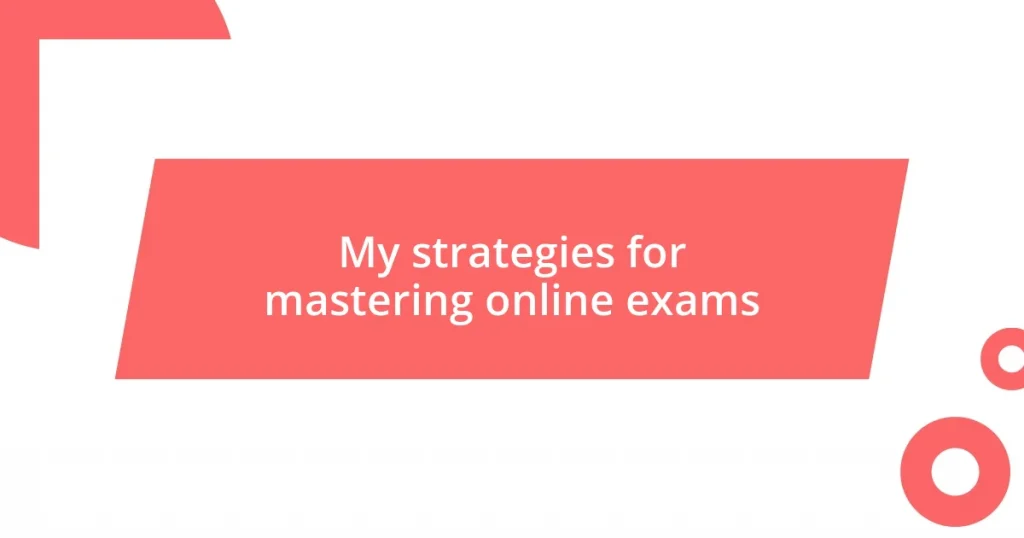Key takeaways:
- Understanding the exam format, time management, and different types (open-book vs. closed-book) are essential for effective preparation and reducing anxiety.
- Creating a structured study schedule, incorporating breaks, and tracking progress enhances focus and productivity leading up to exams.
- Post-exam reflection and peer discussions help identify mistakes, improve strategies, and foster a proactive approach for future tests.
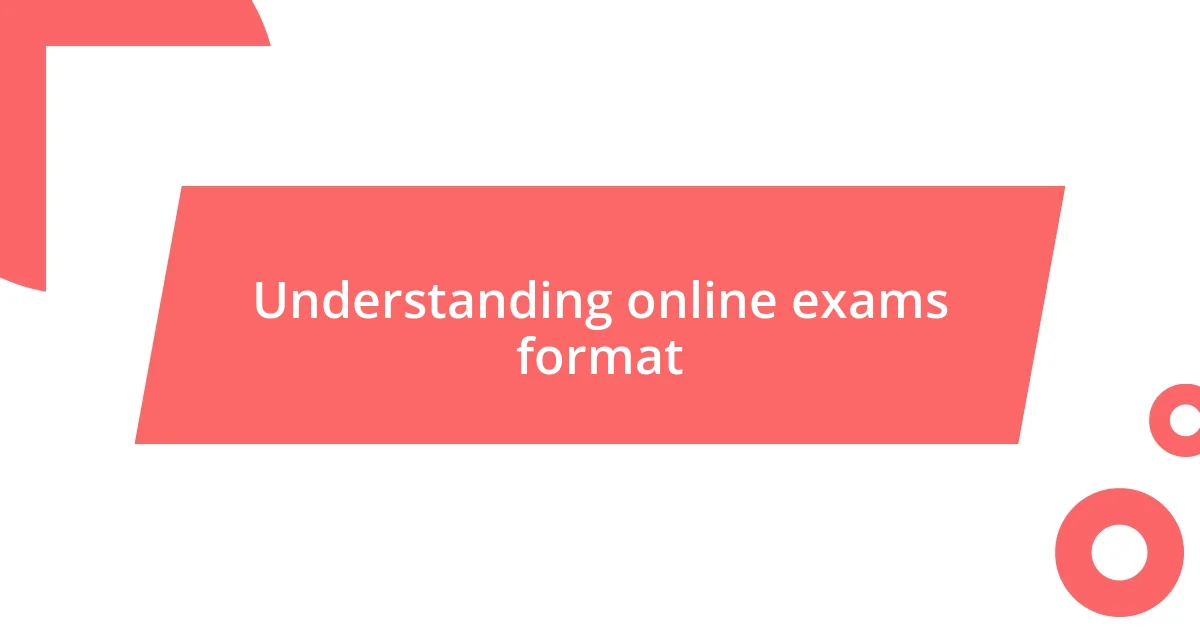
Understanding online exams format
When I first faced an online exam, I remember feeling a mix of excitement and dread. What would the format be like? Would it be multiple-choice, essay-based, or a mix of both? Understanding the specific format ahead of time is crucial. Knowing what to expect not only helps reduce anxiety but also allows for better preparation.
I’ve noticed that some exams are time-locked, meaning you have to complete them in a specific period. This can be nerve-wracking! It’s like being in a race where every second counts. I’ve learned to manage my time effectively by practicing with timed quizzes. Have you ever tried that? It’s an eye-opener, revealing how quickly you need to think and respond in such settings.
Another point worth mentioning is the difference between open-book and closed-book formats. Open-book exams can feel like a safety net, but they require a different strategy since information retrieval is key. I once thought I could just browse through my notes, but I quickly realized that deep understanding mattered more. How do you prepare for these variations? By mentally rehearsing how to navigate each exam type, I gained confidence that has truly paid off.
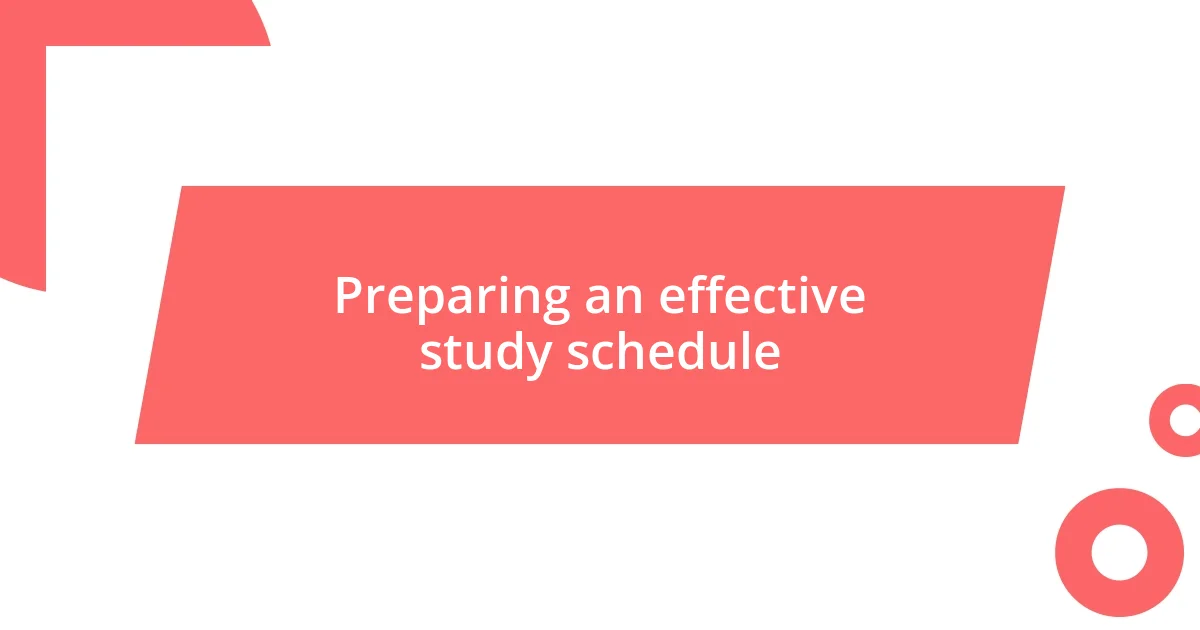
Preparing an effective study schedule
Creating a study schedule can feel overwhelming at first, but it’s one of the most effective strategies I’ve discovered for online exam success. When I developed my first study plan, I was amazed by how structure could transform my approach to studying. I made sure to allocate specific times for different subjects and topics, which helped me stay focused and organized. By prioritizing my tasks based on exam dates and difficulty levels, I felt a newfound sense of control over my learning journey.
To make your study schedule effective, consider these key points:
- Set realistic goals: Break down larger topics into manageable chunks. This makes studying feel less daunting and more achievable.
- Incorporate breaks: I’ve found that taking short, regular breaks increases my productivity and keeps my mind fresh. It’s amazing how a five-minute stretch can reinvigorate my focus.
- Use a calendar: Digital or paper, having a visual representation of your study timetable helps keep you accountable.
- Track your progress: I like to check off completed tasks. It’s satisfying and motivates me to keep moving forward.
- Stay flexible: Life happens, and I’ve learned that adjusting my schedule as needed can sometimes lead to better outcomes than rigidly sticking to my original plan.
By integrating these elements into my study routine, I’ve been able to navigate my online exams with much more confidence and clarity than I ever thought possible.
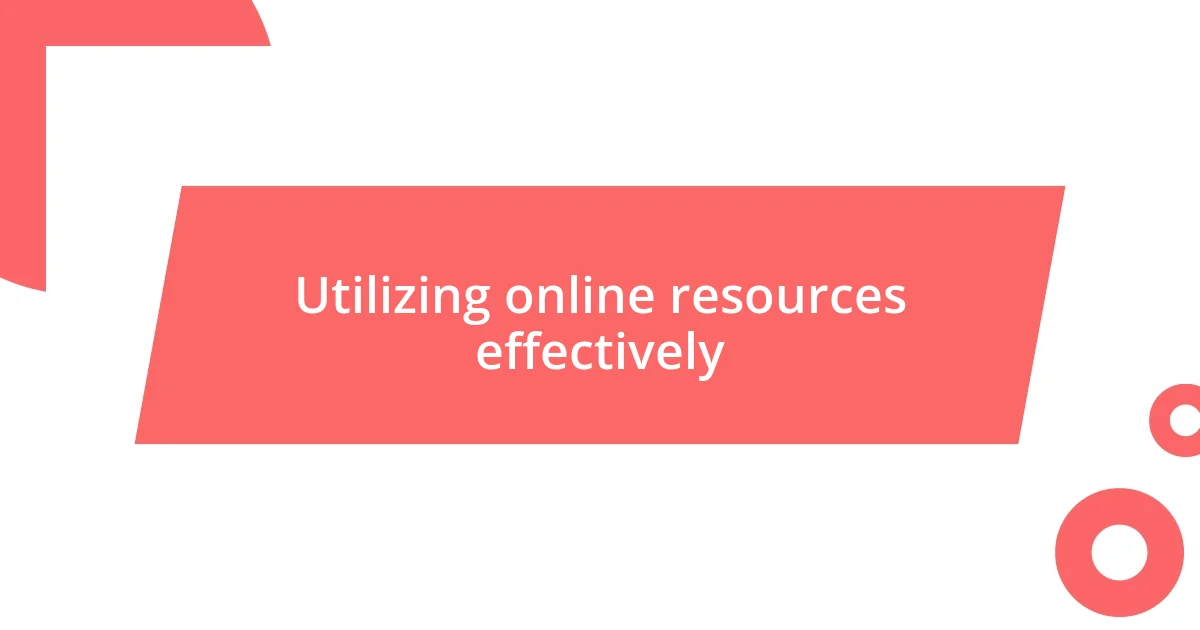
Utilizing online resources effectively
Utilizing online resources effectively has been a game-changer for me during online exams. I often find myself gravitating toward educational websites, videos, and online forums. For instance, when I struggled with a complex topic, a quick search on YouTube led me to a brilliant tutorial that simplified the concepts beautifully. I felt a surge of relief; it was like getting help from a friend who really understood what I needed. Have you ever found a resource that just clicked for you? Those resources can often bridge the gap between confusion and clarity.
My experience with online study groups has also been invaluable. Connecting with peers through platforms like Zoom or Discord not only allows for collaborative learning but also provides a sense of community. I remember staying up late one night, working through a tough set of problems with classmates. The energy was contagious, and we all benefited from each other’s insights. The questions I didn’t think to ask suddenly felt accessible. The camaraderie made studying less isolating—as if we were all in this together.
Moreover, I like to bookmark reliable study resources ahead of time. This keeps my focus sharp during exam preparation, as I can quickly refer to trusted materials without wasting time searching. I often create a resource library with notes, links, and favorite videos that I can revisit as I study. Have you ever felt lost in a sea of information online? Trust me, having everything organized in one place eases that overwhelming feeling and allows for a more efficient study process.
| Resource Type | Benefits |
|---|---|
| Educational Websites | Variety of materials and topics |
| Video Tutorials | Visual and interactive learning |
| Online Study Groups | Collaborative engagement and support |
| Digital Libraries | Convenient access to notes and references |
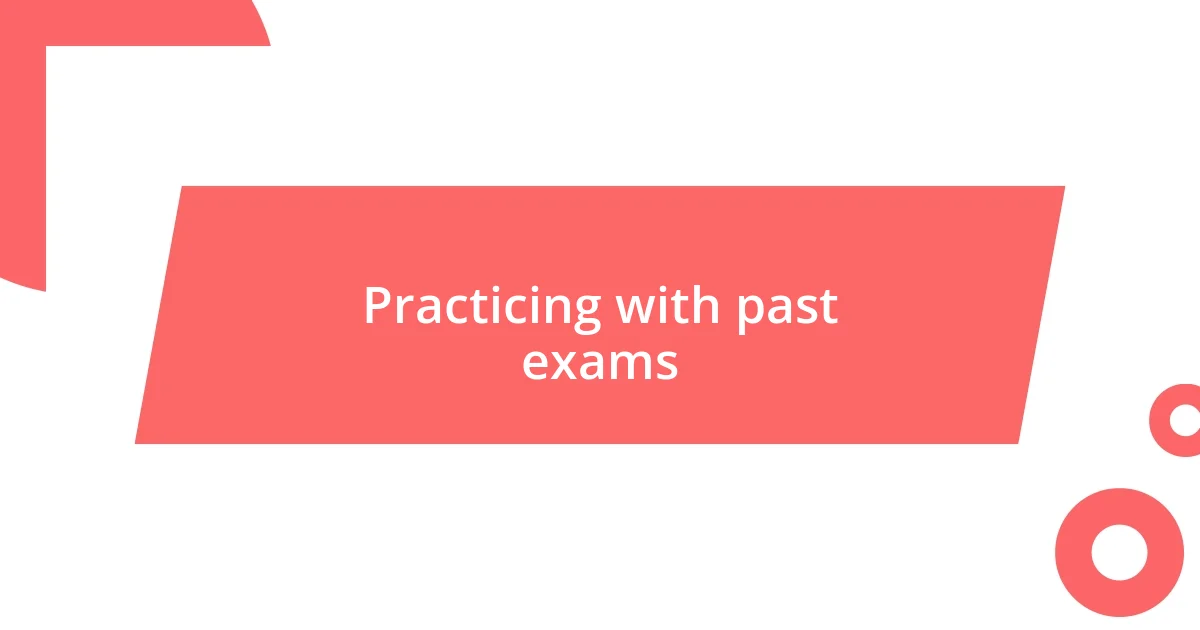
Practicing with past exams
Practicing with past exams has been a cornerstone in my preparation strategy. I remember the first time I tackled a past paper—my heart raced with anxiety. But as I worked through the questions, I realized that familiarizing myself with the exam format eased my nerves. It’s astonishing how exposing yourself to real questions helps you understand what the examiners are looking for, isn’t it?
I often set aside time each week to complete one or two past exams under timed conditions. The thrill of mimicking the actual exam environment can be intense, but it’s also incredibly rewarding. I’ve found that this practice sharpens my time management skills, helping me determine where to focus my efforts during the real thing. Each mistake becomes a learning opportunity, forcing me to revisit concepts and strengthen weak areas. Have you ever felt like a question changed your entire perspective on a topic? That’s the kind of insight I cherish through practice.
Additionally, I always review my completed exams critically. It’s not just about checking the correct answers but reflecting on my thought process. There was one instance where I misinterpreted a question because I didn’t read it carefully. It was frustrating, yet it drove home the importance of comprehension. By analyzing my mistakes, I gain valuable insights—why I stumbled and how I can improve. This practice not only builds confidence but also boosts my overall understanding of the material, turning what could be a daunting experience into an enlightening journey.
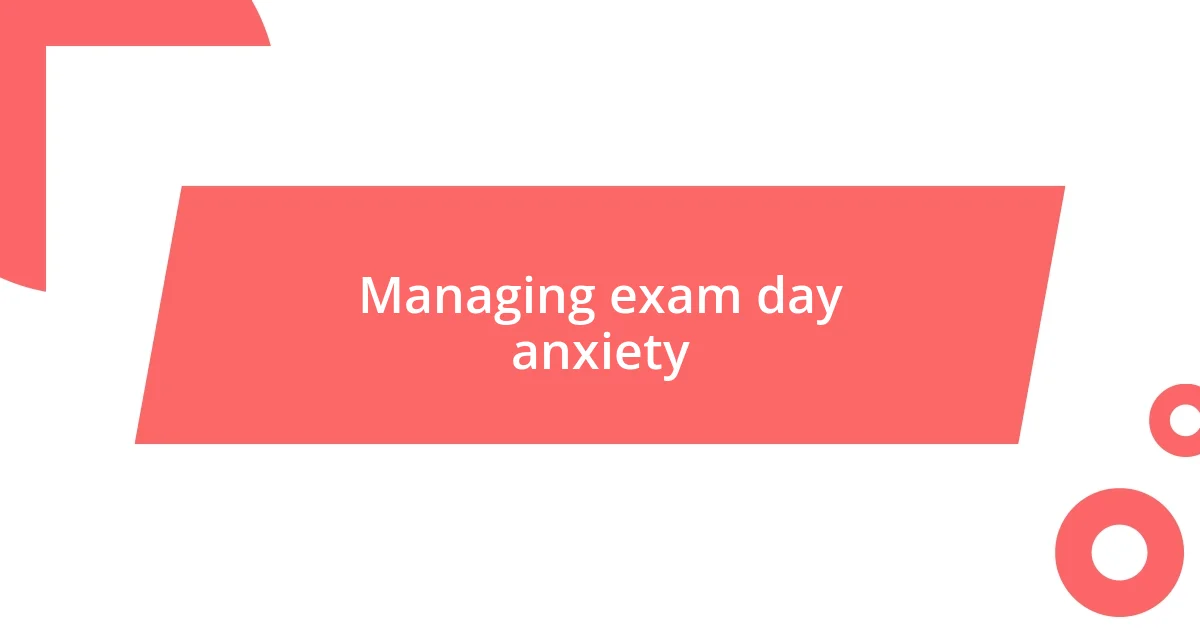
Managing exam day anxiety
On exam day, I often find myself grappling with a wave of anxiety. It’s almost as if nerves whisper doubts, clouding my thoughts right before I log in. I’ve learned to embrace deep breathing as my go-to technique. Taking a few slow, mindful breaths helps me recenter. Have you ever noticed how grounding your breath can instantly clear your mind?
Another strategy that really works for me is visualizing success. As I sit at my desk, I close my eyes and envision myself confidently answering questions, feeling the rush of accomplishment with each completed item. This mental practice not only calms my nerves but also sets a positive tone for the session. I can’t help but think—why didn’t I try this sooner? It shifts my focus from fear to a sense of empowerment.
Lastly, I make it a point to establish a comforting pre-exam routine. Whether it’s enjoying a cup of herbal tea or a favorite playlist, these rituals ground me in familiarity. I remember one exam day, I decided to take a short walk in my neighborhood before starting. It was refreshing, and by the time I returned, I felt lighter and more focused. Routine can be a silent anchor in the chaos; do you have a calming ritual that helps you find your footing?
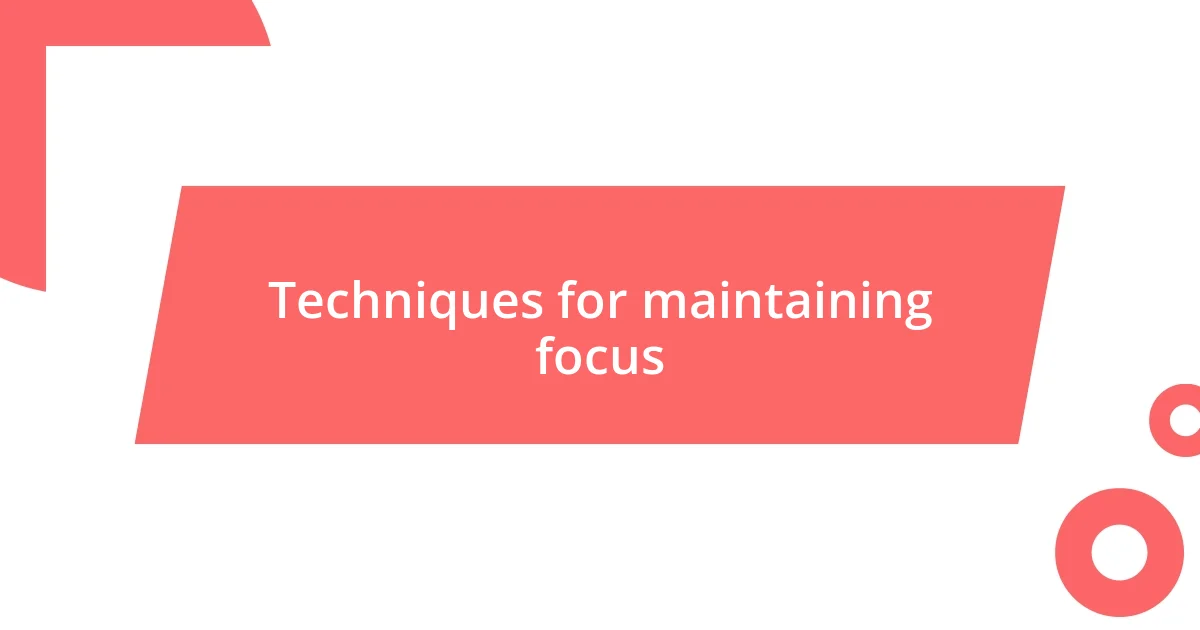
Techniques for maintaining focus
To maintain focus during online exams, I’ve found that creating a dedicated workspace is essential. When I set up a specific area, free from distractions, it sends a clear signal to my brain: this is where I concentrate. I remember the first time I tried this; I cleared my desk of clutter, tucked my phone away, and suddenly felt more in control. Isn’t it fascinating how our environment can impact our mental state?
Another technique I swear by is time blocking. I break my exam into intervals, allowing myself short breaks in between. For instance, during a recent exam, I aimed to focus intensely for 25 minutes, followed by a 5-minute stretch. Surprisingly, that little reset worked wonders! I felt rejuvenated and ready to tackle each question with fresh eyes. Have you ever noticed how stepping away for just a moment can lead to a clarity boost?
Lastly, I keep a small list of positive affirmations nearby. In moments of doubt, I glance at phrases like “I am prepared” or “I can do this.” This approach might sound simple, but it’s powerful. Just last week, when I hit a tough question, reminding myself of those affirmations helped break through my frustration and regain my focus. Do you ever find that a shift in mindset can change everything?
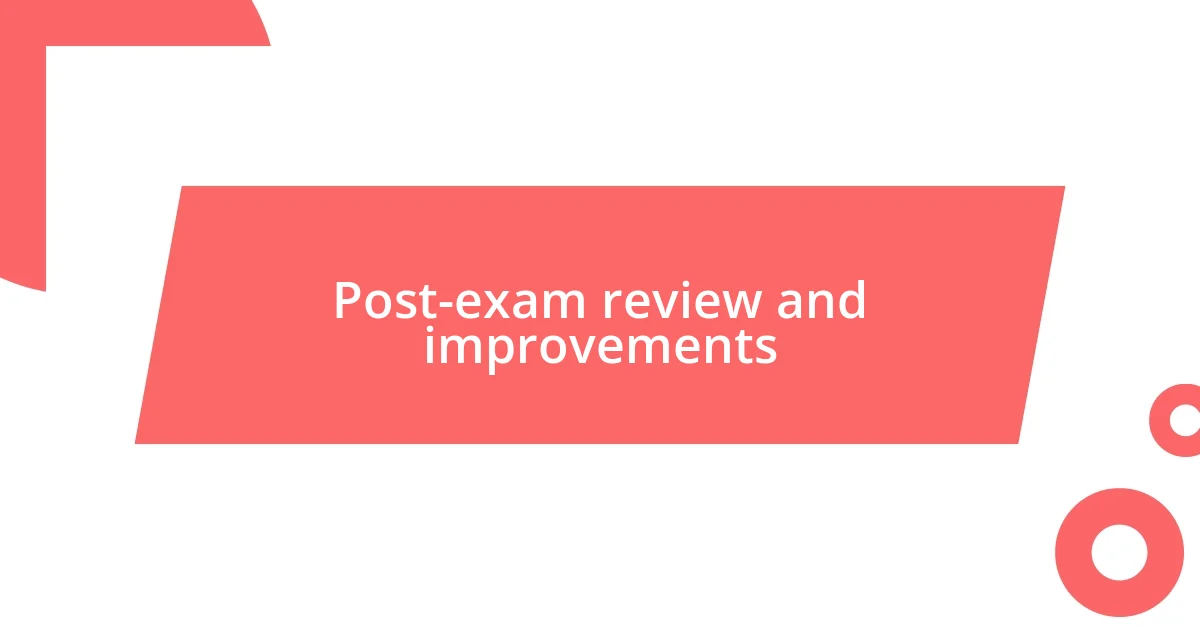
Post-exam review and improvements
Reflecting on an exam after it’s over can be a game changer for improvement. I remember sitting down after my last online exam, feeling a mix of relief and curiosity. I dedicated time to review not just which questions I got wrong, but also how I approached them. This introspection helped me identify patterns in my mistakes. Have you ever noticed how analyzing your errors can reveal hidden biases in your thought process?
In my experience, discussing exam results with peers can be incredibly enlightening. There was one time when a friend shared a novel way to solve a particularly tricky problem. Listening to her method opened my eyes to alternative strategies I hadn’t considered before. It’s interesting to think about how collaboration can often lead to breakthroughs. Don’t you think that sharing insights can fuel our growth more than going it alone?
I’ve also found it beneficial to create an actionable plan based on my review. Following a recent online exam, I listed specific areas for improvement and set goals for my next tests. For example, focusing on time management or understanding material more deeply has made a significant difference in my readiness. Action breeds change, doesn’t it? Embracing this mindset has transformed how I approach my studies, making me feel more proactive and less reactive.










